Physical Therapy Research
The faculty and students in the Department of Physical Therapy engage in a variety of research. Learn more about the Physical Therapy research areas below.
Rehabilitation intervention
Studies focus on the elements of care used to enhance, maintain, and restore quality of life and functional ability for individual with physical impairments and/or disabilities. Examination of actions are taken to facilitate acquisition, maintenance, restoration, or improvement in an individual's health, functional abilities, and/or quality of life.
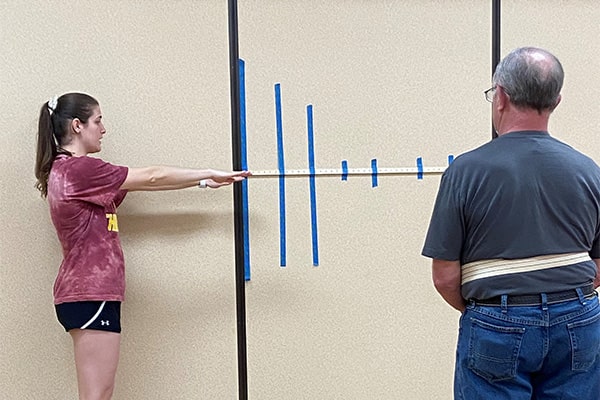
Dr. Haines and her team have been working on developing the Report Card community outreach program for individuals with Parkinson's Disease. This program intends to enhance self-efficacy in managing Parkinson's Disease-related symptoms. This project has been sponsored by the Parkinson's Foundation Grant in 2023.
Email Dr. Haines for more information
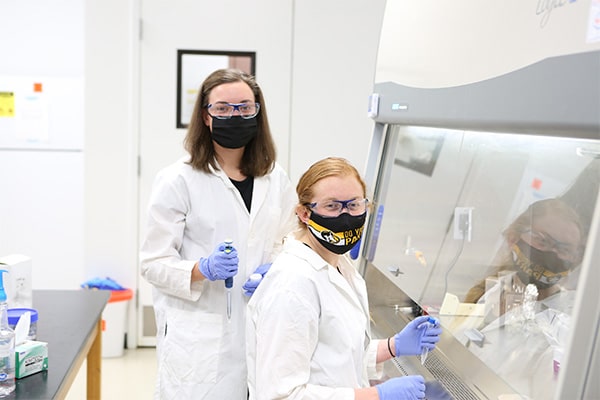
Dr. Gwaltney’s group has been working on developing a novel nitric oxide dressing to promote wound healing in patients with diabetic ulcers.
Email Dr. Gwaltney for more information
Blood flow restriction exercises
Blood flow restriction exercise is emerging as a potential method to increase muscle size and strength. Research focuses on testing effects of blood flow restriction exercises in clinical populations with orthopedic impairments.
Email Dr. Williams for more information
Recent publication on blood flow restriction exercises
- Kilgas MA, DenHerder AE, Lytle LLM, Williams CT, Elmer SJ. Home-Based Exercise With Blood Flow Restriction to Improve Quadriceps Muscle and Physical Function After Total Knee Arthroplasty: A Case Report. Phys Ther. 2019;99(11):1495-1500. doi:10.1093/ptj/pzz110.
Rehabilitation devices
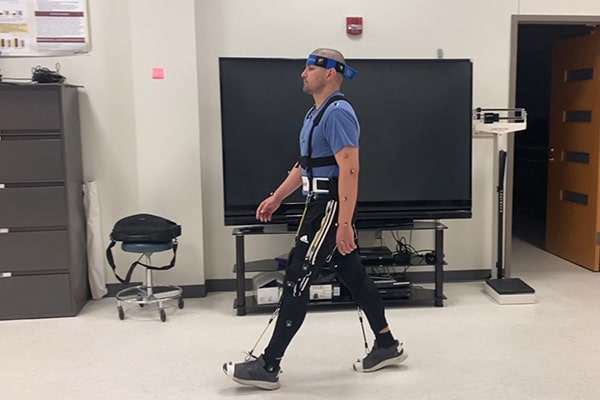
Research involves testing and validation of assistive devices used by individuals to improve or compensate for impaired motor functions. Dr. Ustinova and her team have been currently testing the
feasibility of using the NewGait rehabilitative device in patients with gait
impairments due to stroke or Parkinson's Disease. This project has been
sponsored through a contract with NewGait MI LLC company.
Email Dr. Ustinova for more information
Motor control and learning
Research includes the investigation of movement organization, impairments, and recovery in patients from various clinical populations. This includes patients who have been diagnosed with specific movement disorders, traumatic brain injuries, and those who have Parkinson's disease, autism, or have experienced a stroke. Many research projects are conducted in the motion analysis center, equipped with the system for motion analysis, electromyography, and force plates to examine kinematics and kinetic of movement patterns.
Recent publications on motor control and learning
- Ustinova KI, Leonard WA, Cassavaugh ND, Ingersoll CD (2011). Development of 3D immersive videogame to improve arm-postural coordination in patients with TBI. J Neuroeng Rehabil. 31:8:61.
- VanderHill MS, Wolf EE, Langenderfer JE, Ustinova KI (2014). The effect of actual and imaginary handgrip on postural stability during different balance conditions Gait Posture 40:652-657.
- Austin HM, Balendra N, Langenderfer JE, Ustinova KI (2018) Decomposition of leg movements during overground walking in individuals with traumatic brain injury. Brain Inj, 32(6):739-746.
Human development
Research involving human development focuses on factors that influence infant and child movement strategies. Recent studies have examined influence of the home environment on locomotor acquisition, muscle activation patterns in infants learning to walk, and impact of wearing external support garments on gait parameters.
Email Dr. Sansom for more information
Sensorimotor integration
Research involving sensorimotor integration encompasses the accumulation of sensory input from multiple sensory modalities. This includes but is not limited to, somatosensory stimulation, and visual and vestibular input. The goal of this research in this area of study is to specifically evaluate movement strategies of the body within a controlled environment.
Email Dr. Sansom for more information
Educational research in physical therapy
Research involves experiential learning that impacts students' self-efficacy and skill development, including critical thinking, communication and professional behaviors. Dr. Haine's research involves partnerships with community members including activities that benefit social, mental, and physical well-being in rural areas. Includes activities such as domestic and international service learning, community outreach programs, and embedded classroom partnerships.
Email Dr. Haines for more information
Dr. Schubbe research Physical Therapists’ perceptions of preparedness to practice as culturally competent providers after graduation. The project examined how years in practice, influence of didactic, clinical, and life experiences, and self-reported behaviors contributed to perceptions of preparedness.
Email Dr. Schubbe for more information
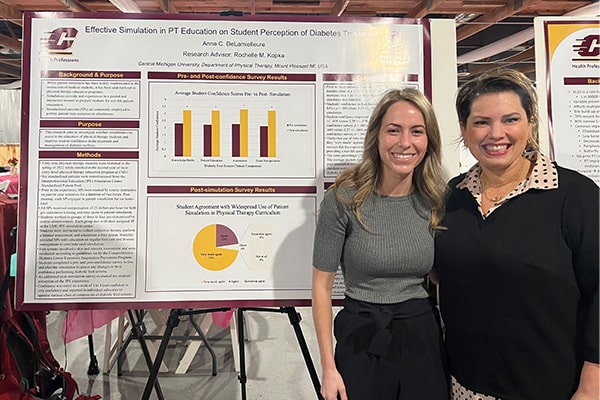
Dr. Kopka's research involves the use of multiple forms of instruction in higher education including lectures, lab format, patient simulation including community partners, and the use of clinical case examples. Simulation-based education has been shown to have positive outcomes regarding student confidence related to a variety of clinical settings. According to studies from several health professions, following simulation, participants’ subjective levels of confidence have been found to increase.
EMAIL DR. KOPKA FOR MORE INFORMATION
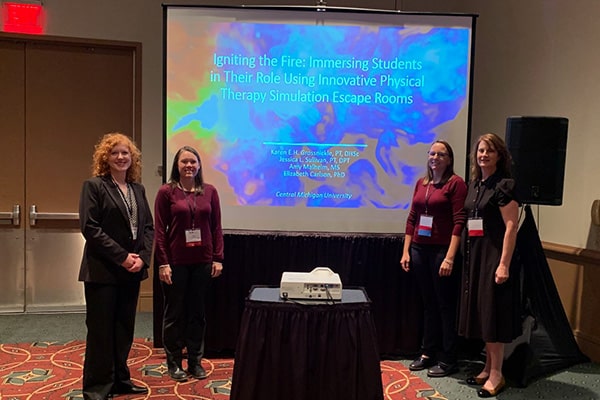
Dr. Grossnickle has qualitative and quantitative research interests that explore pelvic floor physical therapy, educational aspects of teaching clinical reasoning using escape room simulation in physical therapy education, and therapeutic neuroscience education for persons with chronic conditions. Recent studies have included use of an innovative simulation escape room for immersing first year physical therapy students in their role; identification that pain education is as effective virtually as in-person for persons with low back pain; and identification that education altered emotionality, harm, control, and medication domains for people with chronic low back pain. Dr. Grossnickle collaborates with students for her studies as well as other faculty members. She also works with students who elect to participate in case report research during their final clinical year.
Email Dr. Grossnickle for more information
Diet, aging, and neurodegenerative disease process
Research involves exploring the effects of aging, diet and marine-based, omega-3 fatty acids on neuroinflammation, oxidative stress, microglial dysfunction, cognition and neurodegenerative disease processes in rodent models.
Email Dr. Andraka for more information
Ultrasound research
Dr. Andraka and his team use musculoskeletal ultrasound imaging to compare the effects of different types of mobilization interventions.